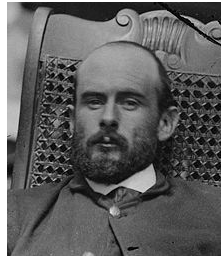
Charles Francis Adams, Jr.
USINFO | 2013-09-04 11:59

Education and Civil War service
Adams was born into a family with a long legacy in American public life. He was the great-grandson ofUnited States President John Adams, and the grandson of president John Quincy Adams. His father Charles Francis Adams, Sr.[1] was a lawyer, politician, diplomat, and writer.
Adams graduated from Harvard University in 1856.
Adams served in the Union Army during the American Civil War. He was commissioned as a first lieutenant in the 1st Massachusetts Cavalry on December 28, 1861. He was promoted to captain on December 1, 1862. He fought with distinction during theGettysburg Campaign, where his company was heavily engaged at the Battle of Aldie. He was mustered out of service on September 1, 1864.
On September 8, 1864 he was commissioned as the lieutenant colonel of the 5th Massachusetts Cavalry (officially designated "5th Massachusetts Colored Volunteer Cavalry"). He was promoted to colonel and assumed command of the regiment on March 14, 1865, shortly before the end of the war. [2] [3] Adams resigned from the Army on August 1, 1865.
On July 9, 1866, President Andrew Johnson nominated Colonel Adams for the award of the rank of brevet (honorary) brigadier general, United States Volunteers, "for distinguished gallantry and efficiency at the battles of Secessionville, South Carolina and South Mountain and Antietam, Maryland and for meritorious services during the war" to rank from March 13, 1865 and the U. S. Senate confirmed the award on July 23, 1866.[4][5]
Post Civil War activity
On May 8, 1865, he married Mary Elizabeth Ogden, daughter of Abram Ogden of New York City, NY. The couple had three daughters and twin sons: Mary Ogden ("Molly") Adams, Louisa Catherine Adams, Elizabeth Ogden ("Elise") Adams, John Adams (1875–1964), and Henry Adams (1875–1951), both of whom graduated Harvard in 1898.[6][7][8]
Following the Civil War, he was appointed to the Massachusetts Railroad Commission. There he attempted to persuade (rather than coerce) railroads into compliance with accepted business norms. Thomas McCraw called Adams's approach to regulation "the Sunshine Commission" since the purpose of the commission was to expose the corrupt business practices in hopes that, once out in the open, the businessmen would be shamed into mending their ways. It was in this vein that he wrote Chapters of Erie. However, true to his regulatory philosophy, he favored the protection of businessmen over that of the consumers. He saw regulation as necessary to protect investors and other businessmen from the capriciousness of a hostile public or the machinations of other unscruplous stock jobbers.[9] He was elected a Fellow of the American Academy of Arts and Sciences in 1871.[10]
Union Pacific Railroad
Adams was president of the Union Pacific Railroad from 1884 to 1890, having previously become widely known as an authority on the management of railways. However, he left his office due to financial problems.[11] Among his writings are Railroads, Their Origin and Problems (1878).
Massachusetts Park Commission
From 1893 to 1895 he was chairman of the Massachusetts Park Commission, and as such took a prominent part in planning the present park system of the state.[3]
Single Tax Supporter
In 1900, he wrote a letter to the President of the Massachusetts Single Tax League, declaring himself a supporter of the reform Henry George had proposed. An excerpt of that letter appeared in The Outlook, December 15, 1900.
Historical writings
After 1874, he devoted much of his time to the study of American history, and in recognition of his work in this field was chosen president of the Massachusetts Historical Society in 1895, and of the American Historical Association in 1901. His writings and addresses both on problems of railway management and on historical subjects frequently gave rise to widespread controversy.[3]
Relations
His siblings include: older sister Louisa Catherine Adams, wife of Charles Kuhn, of Philadelphia; older brother [Hon.] John Quincy Adams II, father of Charles Adams, III; historian Henry Brooks Adams,[6]; Arthur Adams, who died young during their childhood; Mary Adams, who married Henry Parker Quincy, of Dedham, MA; and historian Peter Chardon Brooks Adams, of Beverly Farms, MA. who married Evelyn Davis.
Death and burial
Charles F. Adams, Jr. died May 20, 1915, a week shy of his 80th birthday. He is buried in Mount Wollaston Cemetery in Quincy, Massachusetts. His grave can be found in the Old Section, Lot 337.[12]
Share this page



















